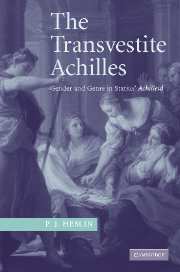Book contents
5 - Transvestism in Myth and Ritual
Published online by Cambridge University Press: 29 October 2009
Summary
Origin is not to be identified with meaning.
H. S. VersnelWe may turn now to the centerpiece of the action of the Achilleid: the episode on Scyros, and the question of how this odd interlude became a part of Achilles' mythical biography. Statius may have been drawn to the story of Achilles' transvestism at least in part because it had not, to our knowledge, been told at great length by any poet since Euripides, nor ever in the epic genre; as he says at the outset, “more incidents [from the life of Achilles] are still available.” As we shall now see, Statius was quite right to claim that the Scyros episode was completely foreign to epic before the Achilleid. We would like to know how Statius differed in his treatment from earlier versions of the episode in literature and art, but, unfortunately, very few of the materials necessary for such an investigation have survived. Among Roman authors, the account of the Scyros episode in Ovid's Ars amatoria occupies a special place, even though it is very brief, since Statius seems to have been responding to it in some important ways; we will therefore defer it for a detailed discussion in the next chapter. Apart from Ovid and the odd casual reference (e.g. Prop. 2.9.16, Hor. Carm. 1.8.13–16) there is no extended treatment of the Scyros myth in Latin verse before Statius.
If we trace the Scyros myth backward in time from Statius, we come first to the Hellenistic age, where we find a small scrap of an epithalamium for Achilles and Deidamia, which was once ascribed to Bion.
- Type
- Chapter
- Information
- The Transvestite AchillesGender and Genre in Statius' Achilleid, pp. 193 - 236Publisher: Cambridge University PressPrint publication year: 2005



